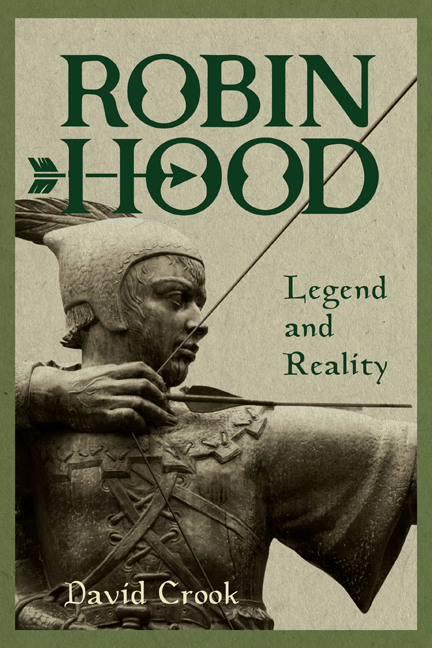Book contents
- Frontmatter
- Dedication
- Contents
- List of Maps and Illustrations
- Preface and Acknowledgements
- List of Abbreviations
- Introduction
- PART I THE LEGEND AND ITS INTERPRETERS
- Chapter 1 The Medieval Tales of Robin Hood
- Chapter 2 Chroniclers, Revellers, Playwrights and Antiquarians, c.1420–1765
- Chapter 3 Editors, the Folklorist and the Archivist, 1765–1889
- Chapter 4 Folklorists, Literary Scholars and Historians: Robin Hood in the Twentieth Century
- Chapter 5 The Robin Hood Places
- PART II OUTLAW AND EVILDOER OF OUR LAND: THE ORIGINAL ROBIN HOOD
- Chapter 6 The Robin Hood Names
- Chapter 7 Robin Hood and Criminality
- Chapter 8 Law and Disorder in Yorkshire, 1215–1225
- Chapter 9 The Sheriff, the Fugitive and the Civil Servant
- Conclusion
- Bibliography
- Index
Chapter 1 - The Medieval Tales of Robin Hood
Published online by Cambridge University Press: 16 September 2020
- Frontmatter
- Dedication
- Contents
- List of Maps and Illustrations
- Preface and Acknowledgements
- List of Abbreviations
- Introduction
- PART I THE LEGEND AND ITS INTERPRETERS
- Chapter 1 The Medieval Tales of Robin Hood
- Chapter 2 Chroniclers, Revellers, Playwrights and Antiquarians, c.1420–1765
- Chapter 3 Editors, the Folklorist and the Archivist, 1765–1889
- Chapter 4 Folklorists, Literary Scholars and Historians: Robin Hood in the Twentieth Century
- Chapter 5 The Robin Hood Places
- PART II OUTLAW AND EVILDOER OF OUR LAND: THE ORIGINAL ROBIN HOOD
- Chapter 6 The Robin Hood Names
- Chapter 7 Robin Hood and Criminality
- Chapter 8 Law and Disorder in Yorkshire, 1215–1225
- Chapter 9 The Sheriff, the Fugitive and the Civil Servant
- Conclusion
- Bibliography
- Index
Summary
The early tales of Robin Hood are the essential starting point for any consideration of the evidence for the origins of the legend, and for any attempt to identify the original outlaw. The first step is to study them; the second to identify the elements of the surviving stories that seem most likely to represent the core of the original legend; and the third to differentiate them from others which are most likely to be later accretions to that core. This process can assist in establishing the chronological context and geographical location of the man from whom the legend derived, if such an individual ever existed. It is therefore necessary to consider in detail the small canon of stories that are now generally agreed to have originated before the early sixteenth century, noting their contents and taking account of the views of recent and contemporary literary scholars and historians about their provenance, their likely dates, how to interpret them, and their late-medieval historical context. The chapter will conclude with a brief review of which elements of the modern Robin Hood legend do not appear in the early tales, the origins of which will require explanation. It is convenient to deal with the early stories initially in the chronological order of their recorded appearance, so far as that can be established by the most recent research.
What is known of the medieval legend of Robin Hood as it existed before the early sixteenth century depends mainly on a handful of surviving tales in manuscript and an early printed text in several versions that derives from an original but now lost written source. They comprise five poems or ballads and a fragment of a play, all in the English language, plus a passage in Latin included in a fifteenth-century Scottish monastic chronicle. They represent not the origins of the tales at some earlier indeterminate time, but the stage of development that they had reached by the time the surviving versions were written down. Before then they had taken the form of verses, recited, chanted or sung by professional or amateur entertainers who depended mainly on memory to preserve the details. It cannot be certain that the surviving written tales record all or even the main themes of the oral material that existed earlier, and what we now have is probably only a fragment of what was performed for medieval audiences.
- Type
- Chapter
- Information
- Robin Hood: Legend and Reality , pp. 7 - 33Publisher: Boydell & BrewerPrint publication year: 2020



